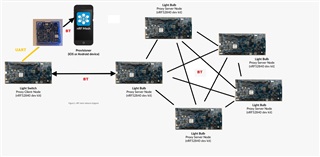Following this tutorial: www.novelbits.io/.../ some doubts arose in my head.
My doubts concern Android app witch name is: nRF Mesh. This application is used only for Provisioning, configure for example witch node is server and witch client. Generally speaking creating rules, but if I want to send data (for example command: "Turn off lamp number XX from ma mesh network witch contains 100 nodes") from my smartphone then I need to use another aplication to do it? Am I right?
In tutorial above we can see that if want to "turn on" one of these two bulbs, then we need to press button on PCB (Programabble form SEGGER EM STUDIO level).
But i don't want to press any button to change the lumination state, because my lamps will by hanging 15 meters above my head :-) It will bee better and more comfortable to press my virtual button on my screen in Android App.
Can someone give mi some tips how to solve this?



